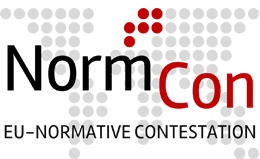
About this project:
The EU-NormCon project addresses the difficulties experienced by the EU as an international actor from a perspective that has not been scientifically explored to date: the new profiles of normative contestation in the EU, their effects on the EU’s international actorness and in particular on its ability to tackle the problems that a shifting global order poses for multilateralism.
The period that began with the 2008 crisis has come to challenge two agendas that are of key importance for global governance and for the Treaty of the European Union: sustainable development and peace building. In this context of global change, the EU, which in the past has been a key player, now struggles to articulate strategies that can contribute to governance through multilateralism. The project EU-NormCon focuses on this reality.
The analytical framework that the project seeks to develop is based on the assumption that the foundations of some values that the EU regards as important and promotes internationally (social solidarity, sustainable development, humanitarianism) are being eroded by the new profiles of normative contestation, which has become less state-centric and more transnational and, therefore, takes place with the participation of more actors (governments, political parties, think tanks, NGOs, lobbies, the media). The project will operationalize the analysis of such changes in terms of cleavages that will provide a means to systematize the European debate.
One of the aims of this project is to analyze the evolution of normative contestation in the EU (independent variable) in a number of specific issue areas within the broader agendas of sustainable development and peace-building. The project also seeks to trace in detail the ways in which such normative evolution is changing the formulation of EU foreign policy in multilateral institutions (dependent variable); and in a more general and aggregated way, to trace how the evolution of normative contestation has changed the way in which the EU faces the great debates on multilateralism.
EU-NormCom aims to reach conclusions that will become a reference in the academic field of International Relations and European Studies. It also aims to produce results that might be of practical relevance for institutions and actors involved in the European debate, as shown by our selection of Entities Involved in the Project.
